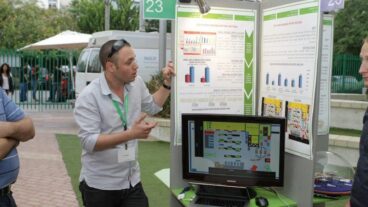A dog suffering from a snake bit is taken care of at the Koret Veterinary School.Imagine one dog asking another: “How’s your health insurance policy? Satisfied with your HMO?” Both are legitimate questions because people and animals suffer many of the same illnesses, including cancer.
Giving the best possible care to sick animals, from lions to kittens, at relatively low costs is a goal of The Hebrew University Veterinary Teaching Hospital at Beit Dagan, Israel’s only veterinary hospital. The hospital also strives to train compassionate modern veterinary care to new generations of veterinary students.
More than forty aspiring vets are trained each year at the hospital’s Koret Veterinary School by a staff of professionals, and their bedside manners hardly differ from counterparts working with two-legged patients. In fact, during a recent visit to the hospital, an encounter with eight-year-old canine Belle, who was in remission after chemo therapy for lymphoma, prompted the thought that the facility’s care, caring attitude and modern care tools might be a model for human-care hospitals.
According to Dean Professor Gadi Glaser, there are 1,200 working vets in Israel and many of them come to the Koret school for continuing education courses. The dedicated staff trains not only the next generation of Israeli vets but also performs some of the world’s most advanced techniques with implications for future treatment of not only animals, but also humans.
Two years ago, a zookeeper at a Tel Aviv suburb zoo noticed their lion Sampson was ailing and couldn’t stand on his legs. The zookeeper called in Dr. Merav Shamir, a specialist in veterinary neurosurgery at Koret.
“The sickness, a malady of lions in captivity caused by a Vitamin A deficiency, is usually not diagnosed until after they die,” Shamir said.
Shamir and her team successfully performed cutting edge brain surgery on the lion and removed tissue growth causing pressure on Sampson’s cerebellum and upper spinal cord. The operation took six hours and by the next day Sampson’s condition markedly improved.
“We have the same specialists as you would find in a hospital for people – emergency and intensive care, a cardiologist, an oncologist, neurologist, a specialist in infectious diseases, an ophthalmologist and dermatologist” hospital director Hylton Barak told ISRAEL21c.
According to staff member Dr. Dahlia Berlin, the hospital is unique because “we don’t give up on sick animals.” Berlin, a horse lover from childhood, spends most of her time working with the newly opened Horse Breeding Center for race and show horses.
Pulling a long plastic glove on her hand and arm, Berlin probes inside a thoroughbred mare’s rectum to perform an ultrasound. Looking at the screen she comments: “Ginger will have a double ovulation.” Within an hour, the young vet will artificially inseminate Ginger.
“The frozen sperm – priced at a hefty $7000 per treatment – comes from England. We have had an 80% success rate,” Berlin reports. “Within seven to nine days we will transfer the embryo to a surrogate mother. This way, Ginger can have four foals a year instead of one.”
“Sometimes the foals need extra care after birth,” adds Dr. Amir Steinman, director of the Department for Large Animals and head of the Horse Breeding Center. “This year, we had to give plasma to thirty foals born with sepsis and unable to nurse. They were missing antibodies normally obtained from the mother’s milk.”
Steinman indicated a foal with a bandaged left leg. “He was unable to stand up and nurse. After treatment with medication and physical therapy he is going to be OK. It’s not like in the movies where they kill a horse that can’t stand up,” Steinman reports.
A racehorse that broke his leg entered a new career at the Center as the resident thoroughbred stallion, said Steinman. Next year the Center will add four more stallions to the team. There are 25,000 horses in Israel – some are racehorses and others are show horses.
“Owners like horses that are born in the beginning of the February breeding season because they are stronger and faster,” said Steinman. “Israel is already in the business of exporting foals.”
In years past, Arab countries lacking sophisticated vet care have brought horses to Israel for care. “We have worked with Arab researchers,” said Steinman. “I would like to see more collaboration. Pathogens don’t stop at the border; a pathogen that is deadly to camels has been prevalent in Jordan, for example. We would like to combine joint research efforts on this and other local diseases.”
Current HU Veterinary School research into drug delivery will benefit humans as well as animals since, like humans, dogs and cats spurn foul smelling and tasting medicine. Administering it on a regular basis is usually a hassle.
Hospital assistant director Dr. Eran Lavy belongs to a research team that has developed small controlled release oral formulations that embed drugs in a multi-layer, unfolding polymer matrix. The new “accordion time release” technology incorporates capsules with effects lasting four to five days and doubling drug absorption, reducing standard dosages and decreasing side effects. Startup company Intecpharma Ltd. in Jerusalem is commercializing a range of these time-release products.
“Right now, we are trying to develop a special sustained-release dosage form for the control and treatment of dental problems in dogs. This dosage form may be apply to kangaroos who contract life-threatening Lumpy Jaw disease,” said Lavy, who also has a degree in pharmacology.
Lavy is particularly excited about a patented GRDF (gastro-retentive dosage form) they have developed and tested that works for dogs and people. “The capsule is absorbed continuously and effectively into the bloodstream. The innovation can work equally well in human diseases such as Parkinson’s, which needs a steady supply of levadopa, and diseases such as AIDS that require continuous antibiotics,” Lavy reports.
Other time-release drugs are being formulated in cooperation with Jerusalem’s Biblical Zoo for easier treatment of zoo animals.
If there is a modern day Noah of Noah’s ark – reputed to have labored over tasks of animal feeding and care both day and night – then the Hebrew University Veterinary Teaching Hospital is probably the closest personification of the Biblical character. They are devoted, caring and on the cutting edge of animal – and human – medical treatment. ![]()
Slashdot It!![]()












